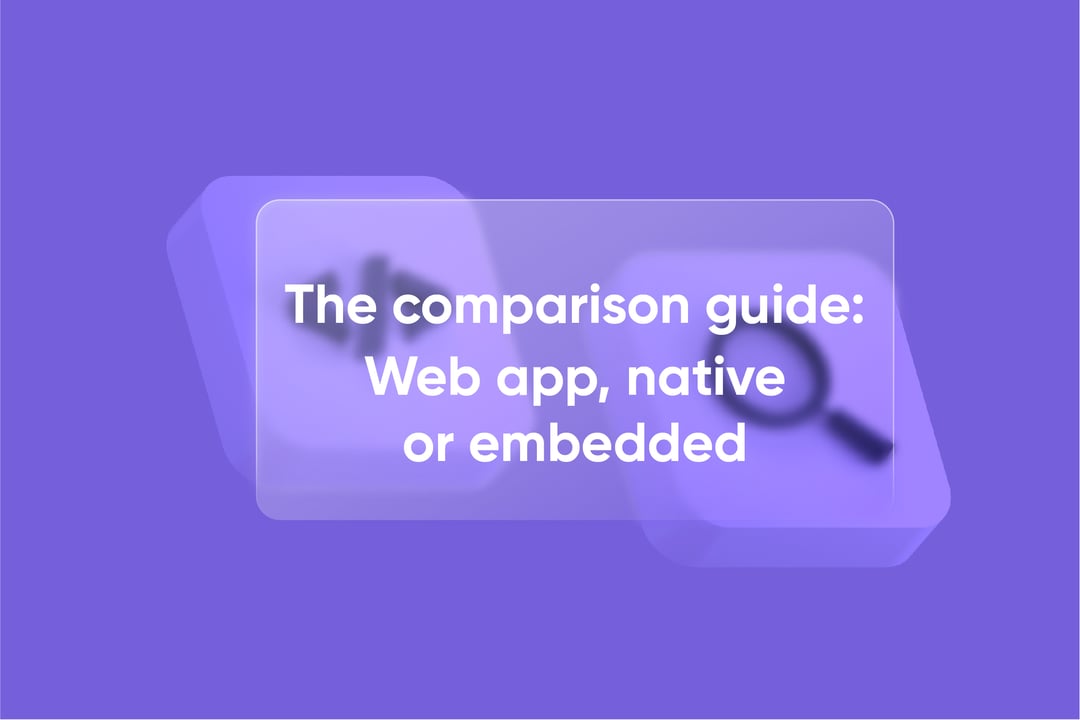Are you thinking of digitizing your hotel's guest experience by implementing an app, but don't know where to begin?
Keep calm. You've come to the right place.
Unless they explain it well, it is not an easy process. However, this trend cannot be avoided, as shown by the statistics:
A survey conducted in Europe and the US found that 76% of hotel guests consider their smartphones their best travel companion. Similarly, 80% of hotel guests would download an app that provides them all the information about their hotel and allows them to check in and out.
As a result, whoever adapts their hotel stay and services to digital guest experience solutions will be able to survive. Those of you who are thinking about it have good news:
In order to make your life easier, we've prepared a visual and concise comparison of different types of hotel apps.
Here are three ways to implement an app to digitize your hotel services and its benefits:
👉 Web app: get rid of downloads.
👉 Native app: longer lifespan.
👉 Embedded app: boost your existing apps.
There is no conflict between these three options. If you choose one to begin with, you are not bound to it. There are times when they are part of a natural process, where you begin with the simplest option and move on to a more comprehensive one.
Find out which app is right for your hotel through a comparison
Our comparison below will help you understand the different types of apps and determine which is the most suitable for your hotel. The implementation of an app for an international chain with operations across 10 countries is different from that of an independent or boutique hotel.
This article is focused on providing you with clear ideas so you can move forward.
Web app: download-free
Web apps are hotel applications that do not require users to download them. Your hotel's app and content are displayed in the web browser. It is an internet-based application.
You may be wondering: "how do guests gain access?" 👀.
Here's how it works. By implementing QR codes in strategic locations, a hotel's URL can be shared via a web app. These QR codes will direct guests to the hotel's intended content. By avoiding the home screen of the application, they will save time.
An example of how a web app can be used in your restaurant is to enable QR codes on the tables, so that a guest can scan them to access the restaurant's menu immediately after scanning them. Likewise, with other services.
How can web apps benefit you? Direct access and download-free
-
Unnecessary downloads are avoided. Since users already have a lot of apps on their smartphones, they are hesitant to download an additional app. This barrier is erased by web apps, since they do not require downloading.
-
Using them is comfortable. With a few seconds and a simple QR code scan, a guest can access relevant content from one location, such as a restaurant menu.
-
They are quick to implement. Your hotel can implement it easily.
-
It is easy to transition from a web app to a native app. The content of a hotel is already available for transitioning to a more comprehensive or more functional application if you start with a web app. It is a very fast process.
-
Prevent storage problems on devices. A web app is an alternative to an app for guests who do not want to download an app.
-
Lower cost and maintenance. Compared to other more advanced solutions, it is a cheaper option.
For what type of hotel is a web app recommended?
As we said before, there is no concrete answer to solve what type of app a certain hotel needs. However, we can say that –as a general rule– the web app adapts very well to the operation of two specific types of hotel.
1. Urban hotels
Small hotels without a wide variety of services. For example, independent urban hotels. The average overnight stay in this type of hotel is usually short. And as it is an independent hotel, it is not very practical to download an app, since its lifespan on the guest's smartphone is basically a couple of days or even hours.
2. Chains or resorts
As a starting point, it is also recommended for any hotel that thinks of an embedded app or a native app in the short or mid term. Why? Because it is the fastest way to find out about all the services that can be implemented in your hotel, resort or chain. It is simple and does not have a great cost.
The transition from web app to native app or embedded app is very agile once the web app has been implemented as a starting point.
Take a look to this special post of how resorts are improving their guest experience.
Native app: For long-term use/guest loyalty
A native app is one that guests must download from the App Store or Google Play on their smartphones.
Just like web apps, it is created and designed according to the hotel's brand image. It has an important difference, however: the native app, which has a personalized design, has a longer lifespan. Whether it is a resort or a hotel chain, the idea here is to convince the guest about its usefulness, so they don't hesitate to download it.
Thus, it encourages loyalty –as we will explain later– offers more features than the web app (such as the mobile key), and is more useful in the long run. Next, we will go into details.
What are the benefits of native apps? Suitable for long-term use
-
Usability is improved. Although the usability and browsing speed of the web app are high, both improve if the hotel uses a native app.
-
Activation of more guest experience features. Some services can only be implemented through the native app. For example, the mobile key.
-
Push notifications. This type of app allows you to send push notifications on both iOS and Android
-
All hotels in a chain can use the same app. In other words, if a guest downloads the app at a certain hotel, they can continue to use it at any other hotel in the chain. Therefore, it is more attractive to keep it on their smartphones.
-
It allows you to combine stay functionalities with access to “reservation” and “loyalty programs” for example, thus increasing the percentage of reservations through direct channels.
For what type of hotel is a native app recommended?
Many chains use the native app, but this does not mean they must all do so. As we discussed in this article, they are not mutually exclusive. You can sometimes start with a web app and make a faster and easier transition depending on your needs.
However, there are a few types of hotels for which the native app is more recommended.
1. Chains with several hotels
In addition to promoting offers and loyalty strategies through the app, the possibility of the guest staying at another hotel property is a factor that justifies its download.
2. Resorts with a wide range of services
Hotels with higher average stays than urban properties.
Consider these two factors:
-
In this post, we clarify that these are only recommendations, there are independent hotels taking full advantage of the native app.
-
A web app is recommended for hotels that are starting to digitize their services, since it allows them to have an idea of what they can offer their guests through an app in a fast and affordable way. Eventually, the jump to a native app is agile and quick.
Embedded app: reinforces an existing app
There are times when a hotel chain already has an app developed. Technology providers, however, are like football players. Some are known for their defensive abilities, while others are known for their scoring abilities, etc.
These types of apps are no different. There are sometimes robust apps that don't digitize hotel services during the guest's stay. Someone might consider changing the provider, the application, and spending a lot of resources (time and money).
Stay calm. Embedded apps are the best solution.
An app that specializes in digitizing services can be embedded in an app of a chain that has not built these functionalities, making the guest experience better.
How can embedded apps benefit your hotel? Easy to Implement
-
Simple and faster implementation in existing apps. If you detect that your hotel app has aspects that could be improved, for example, the digitization of hotel services, implementing these functionalities through an embedded app is easier than starting a new app from scratch.
-
Cost reduction. It is much cheaper than starting an app from scratch to polish an already existing app.
-
It is an edition of a native app. It also improves the brand image, helps loyalty, differentiates from competitors, and gives guests access to all of the features.
For which hotel is an embedded app recommended?
Embedded apps are especially recommended for hotels that once opted for digitalization, have a native app, but use a provider who is not specialized in some functions that are vital today.
An example would be a hotel with a native app but no digitization of services during the guest's stay.
As a result of the embedded app option, the chain can reinforce the app they already have without the guests even realizing it, as each section of the app will appear to be homogeneous, even though two different technology providers are involved.
It maximizes the guest's experience, as well as improving the hotel's online reputation, increasing revenue, collecting extremely valuable feedback, and fostering immediate human contact between guests and staff.
Select the app that best suits your hotel's needs
In the beginning of the article, we said that each hotel has its own world, and this article will help you put that together. According to STAY's experience –with over a thousand digitized hotels in its portfolio– these recommendations fit the cases perfectly.
You are the only person who knows the details of your own hotel so you know better than anyone else which are the needs of your property. But keep in mind that you can always contact with our sales team if you would like to dig deeper.
The trend toward digitized services is unstoppable, and guests are increasingly demanding more and better services. To put it another way, choose the app that best suits your hotel. But make sure you go digital.



